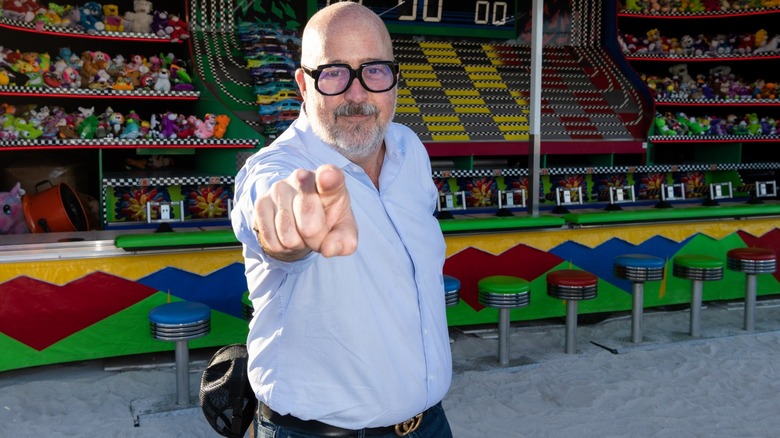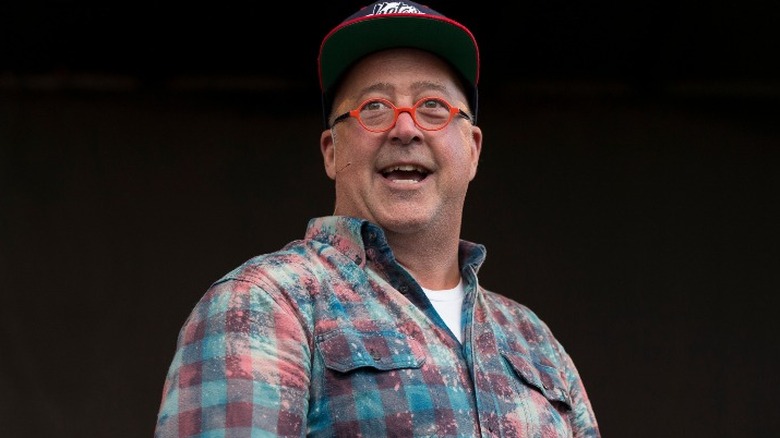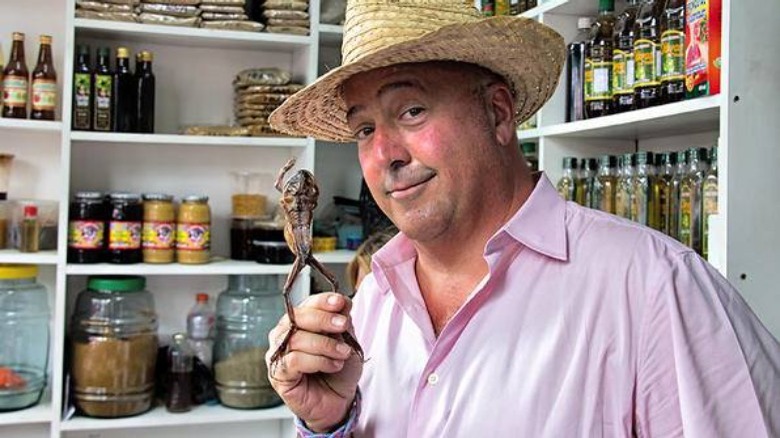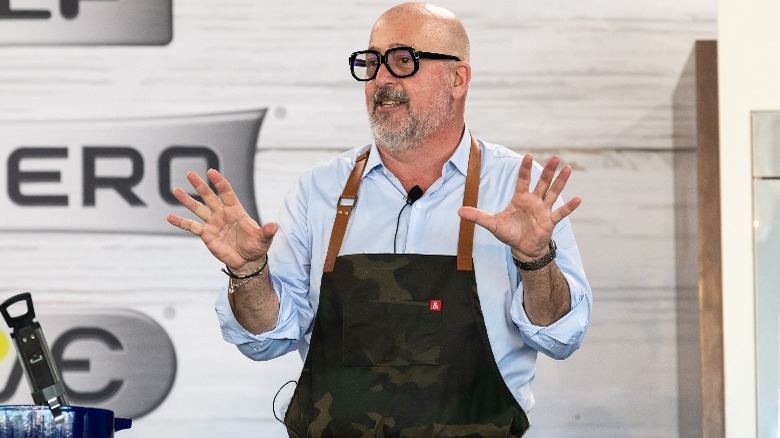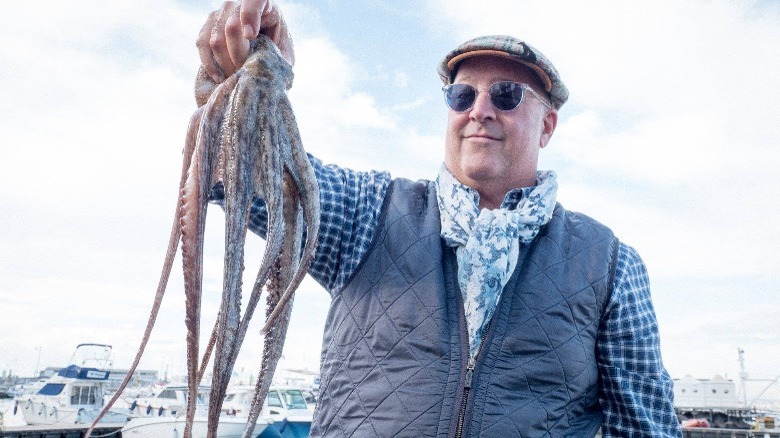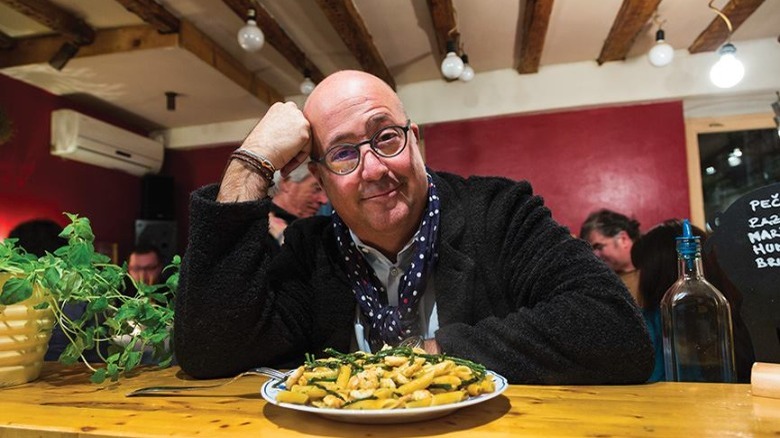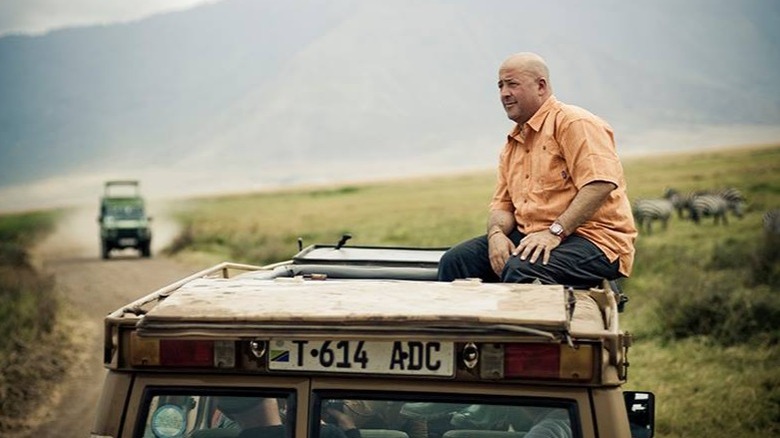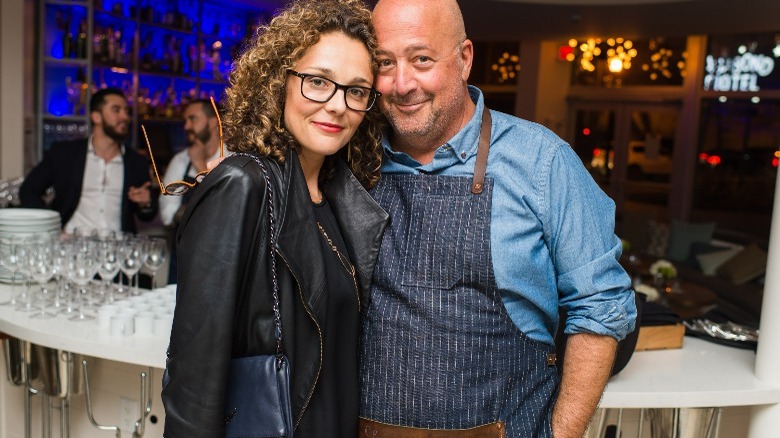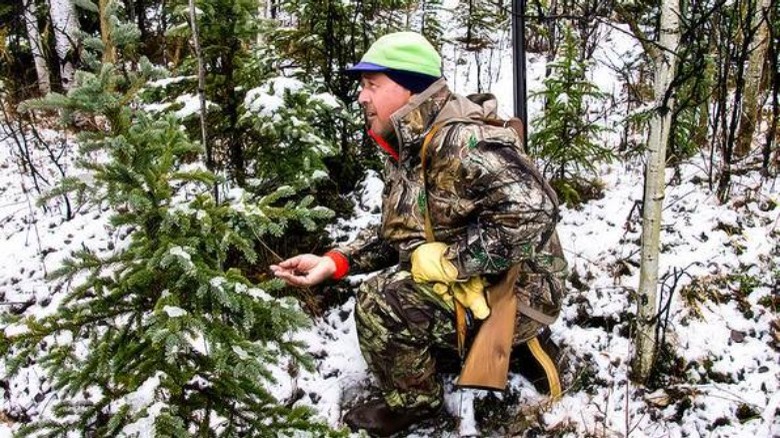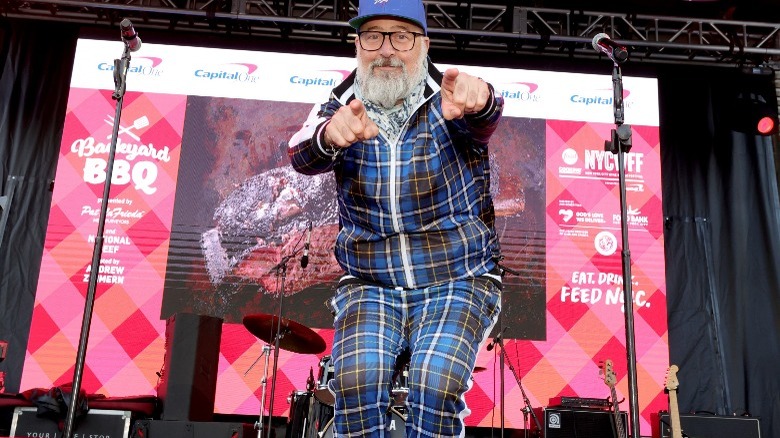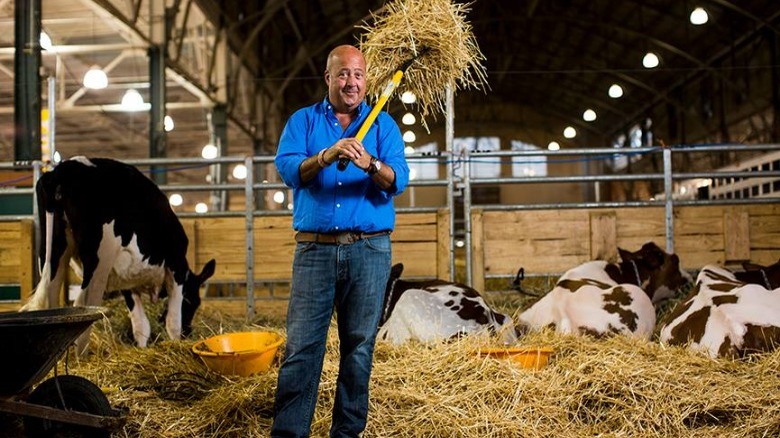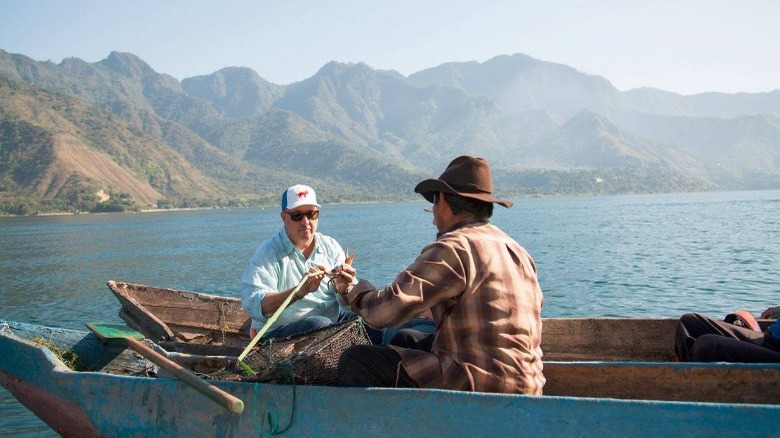Andrew Zimmern Was Never The Same After Bizarre Foods. Here's Why
With as many as 260 days spent traveling a year (via Forbes), it's not surprising that at times Andrew Zimmern's dream destination has been his "own bed with 3 or 4 unwatched episodes of 'Game of Thrones' on the DVR" (via Johnny Jet). His Travel Channel series "Bizarre Foods" certainly made some people cringe, while others stared in awe as Zimmern ate countless unfamiliar foods on screen.
In the series, which ran from 2006 to 2018, Zimmern dined at the finest restaurants one day and wandered through deep rural areas the next. Needless to say, it changed him a lot and it continues to define him today, including his food choices. In an interview with Lifehacker, Zimmern shares that his fridge is filled with condiments — red tahina from Jerusalem, fermented chili bean paste from China, etc., — collected during his travels. The series also made him conclude that the most bizarre food of all is the commercial American hotdog (via Cooking District).
Besides fame, "Bizarre Foods" brought Zimmern face to face with tricky situations including death on various occasions, but he ultimately emerged from it all with a greater zest for life.
Bizarre Foods made Andrew Zimmern famous
As odd as it may sound, what catapulted Andrew Zimmern to fame was his audacity to eat elk testicles. A 10-minute clip of him snacking on elk and ostrich meat was filmed by Minnesota-based television production company Tremendous Entertainment and sent to Travel Channel as a pitch for "Bizarre Foods" (via Minnpost). The clip was well-received, and led to some pilot episodes for "Bizarre Foods Asia" and "Ballpark Eats". Three years later, Zimmern found himself traveling around the world eating, well, bizarre food. The episodes got as many as 75,000 viewers with each one replaying 20 to 30 times, per his business manager John Larson (via Minnpost). Are you doing the math?
In the years following the launch of "Bizarre Foods," Zimmern's fame billowed to an extent that he started getting calls to appear on shows with Jay Leno, Anthony Bourdain, and Carson Daly (via IMDB). "Bizarre Foods" even had its own spinoffs: "Bizarre World," "Bizarre Foods America," and "Bizarre Foods: Delicious Destinations." Zimmern, who had dived in and out of the restaurant industry without prolonged success, became a celebrity for eating adventurously on screen. With fame comes a lack of privacy: "I've been followed in hospitals with a camera phone through an oncology ward. People have trampled my wife and kid to get to me," Zimmern told Minnpost in a 2013 interview.
The show took him to over 170 countries
Andrew Zimmern has been to more countries than most people can identify in an atlas. Though he caught the travel bug from his dad, it was "Bizarre Foods" which gave the bug its wings. Now, the chef has a suitcase packed and ready to go at all times. "The dirty laundry will come out of a bag when I return home and go back in right away once it's washed and dried. I just travel so much, it's really the only way to do it," he told Forbes in 2019. With an itinerary that can sometimes include seven flights in six days, per Johnny Jet, there is no time to reset at home.
Anyone who feels the need to take a vacation to spring back from vacation might wonder why he does it. Zimmern recognizes that "The power of travel can be transformative," essentially eliminating all fetters of a monotonous life (via Forbes). Zimmern sure wouldn't have found himself tasting Samoan coral worms and Japanese lethal fish if he was still running a restaurant in Minneapolis (via ABC News). A lot of learning can be gained through boundary-pushing moments, and that is exactly what Zimmern seeks in his travels and shares with his audience.
He made some big changes to his vocabulary
With fame comes responsibility, and Andrew Zimmern soon realized that his words weren't merely sentence fillers but had the power to unite or divide his audience. For example, when he said that Filipino food was going to be the next big thing in 2012, he was met with disapproval. According to Thrillist, numerous people said that calling it a trend disregarded the centuries-old history of Filipino food. Then, in a 2018 interview with Fast Company, he belittled Chinese restaurants in the Midwest, offending many people, per Eater.
Speaking with Fast Company, he mentions learning important lessons ever since he expanded the circle of people he dined with. Zimmern acknowledged that in its initial days, the series did portray "a lot of cultural insensitivity" and "a lot of playing somebody else's serious cultural totems." The show has even been accused of "exoticizing poverty." As per the book "The Political Language of Food," "Bizarre Foods" engages in "poverty tourism," a practice Biana Freire-Medeiros argues "is a by-product of Western fascination with the exotic 'Other.'"
After becoming the executive producer of the show in its third year, Zimmern adjusted his storytelling and barred himself from using phrases such as "ethnic food" and "hole in the wall" which he had come to realize as being "derogatory and steeped in white privilege" (via The New York Times).
Wastefulness in America became evident to him
How do you eat shrimp? According to Zimmern, your answer to that simple question could explain a lot about how much you care about food waste. Here's an eye-opener for those whose idea of a feast is endless headless shrimp from Red Lobster: The heads contain all the flavor. But as a culture, "we [Americans] eat for speed and convenience," Zimmern told Travel Channel.
In 2001, Joe Klaus, the director of marketing for a large seafood company told The New Yorker that only 5% of the 950 million pounds of shrimp sold in the U.S. have their heads still on, which isn't the case in Europe, Asia, or South America. Zimmern reached the same conclusion in his travels, noting that in Japan the heads are served "as a second course to call out their importance," (via Travel Channel).
During his "Bizarre Foods" days, Zimmern learned that outside America, "lessons of our collective grandparents and great grandparents are still observed." In an interview with Waste 360, he shares how cultures around the world prioritize seasonal ingredients and use food scraps in creative ways to stretch them further. From these experiences, he has summarized a number of tips for people eager to reduce their food waste.
He lost confidence in America's food systems
For those who wake up dreaming about french toast with maple syrup or sugary cereal, Zimmern's words might sting a bit: "The American breakfast is toxic for people" (via Lifehacker). He views Japanese breakfasts as the ideal healthy and delicious combination: "You have some pickles, and a little bit of rice, and a little bowl of broth of some kind, and a little piece of leftover broiled fish."
It took just over a year of travel around the world for the celebrity to realize there is something wrong with the way America eats. On his website, Zimmern writes, "We are heading down a dangerous path. 30 percent of our kids are obese. One in every six people in our country is food insecure." Calling the food system in America "damaged", he elaborates, "It's been commoditized, grown unsustainably large and mechanized, sped up so much that we've entered a danger zone." How can we help? Zimmern suggests eating more vegetarian food, replacing imported salmon with small fish available seasonally, and opting for wild game protein sources.
Zimmern began to use food to fight for social justice
Zimmern sure can eat a bug in a blink, but he never wanted to only be known as a "fat guy [who] goes around the world and eats bugs" (via Fast Company). His goal was to educate people about different cultures, and if he sometimes had to eat braised pig foot ice cream, so be it. "Food is the perfect microscope with which to view a culture. I can learn more sitting around the table in Spain than visiting a museum," he said in an interview with Blue Zones.
After 13 seasons of "Bizarre Foods," he decided to turn his attention to the throbbing question: "What's Eating America?" The five-episode docuseries started off by exploring the role of immigrants in keeping America's food system stable. "If you take those workers out of our food system, it literally stops. Immigrants, migrants, documented, and undocumented people touch every plate of food in America, at every single stage," Zimmern, who was named UN's Goodwill Ambassador in 2021, told NBC News.
In other episodes, Zimmern talks to reformed felons stripped of their voting rights and tries to understand the future of farming directly from scientists (via Andrew Zimmern). Why is he taking these perspectives? Per Eater, Zimmern stated in a press release that "There is no more important time than right now to be telling stories about civics, politics and culture through food."
Bizarre Foods led to his divorce
Though Andrew Zimmern gained lessons about family and togetherness from the tribes he met, it didn't help sustain his own family. His travels took a toll on his personal life, leading to a divorce with his wife of 18 years, Rishia Haas, in 2020 (via Mpls.St.Paul). "I wasn't there for my wife, and I wasn't there for my son," he told The New York Times a couple of years earlier.
The couple tied the knot in 2002 after meeting at a cookware store that was part of a cooking school where Zimmern taught in 1999 (via "Zany Eats with Andrew Zimmern"). This was before he had become a celebrity; in fact, he had just quit the restaurant business and gotten into food media assuming the change would allow him to have a good work-life balance (via NYT).
Their child Noah was born in 2005, and the trio regularly vacationed to Disney World, as per MinnPost. Zimmern shared, "My wife gave me a thousand chances to make it right," however, he confessed that he was too carried away by all the publicity (via NYT). Letting bygones be bygones, now Zimmern has a new goal: "I want to be the best dad and the best ex I can be." Even after their split, Zimmern continues to be friends with his ex-wife. On Mother's Day 2020, he announced to his million followers on Instagram that Rishia was "the bravest mom" he knew.
Filming made him face his worst fears
"Bizarre Foods" often placed Zimmern in high-risk situations. For example, in an episode shot in Iceland, he had to sail on a rubber boat through the raging sea waters to see how the locals hunted puffins. The risk of being attacked by a pod of monstrous killer whales swimming nearby added to the fear of drowning in the freezing waters. "The immediacy of the situation was oddly thrilling, and I am not a ballsy guy by any stretch of the imagination," he writes in "The Bizarre Truth: Culinary Misadventures around the Globe."
Zimmern also recounts his days in Lwanika, a village in Africa, where he had to sleep in a small tent while being vigilant of the elephants and lions that were known to roam the area. "I spent most of those nights lying sleepless in my tent, too terrified to [venture outside] for fear of being devoured by something," he wrote. Though Zimmern has been clear that he is "not a thrill junkie" or someone trying to make a Fear Factor-like show (via ABC News), diving into the waters in Australia despite being warned about sharks and eels can appear otherwise. Thrills aside, he did it because that's how the locals collected shellfish, crustaceans, and mollusks and he wanted to experience it for himself.
Zimmern became a hero figure for those fighting drug addiction
For someone whose life looks like one long vacation, Zimmern has been through some bleak times. He started drinking alcohol while still in school to deal with his mother's health issues (via The New York Times). Though the Vassar graduate was brilliant at being a chef, his addiction put his career on pause, worsening to a point that he had to steal to survive. "I was the vagrant pushing the shopping cart that people crossed the street to avoid," he said.
He has been sober since 1992 but has kept the past fresh in his memory. "It's my greatest asset. [...] if it can be helpful to someone else, I'm anxious to share it," Zimmern said in an interview with The A.V. Club. Ever since "Bizarre Foods," more people are interested in knowing about his battle. Today, his office receives tons of messages from people who want to thank Zimmern for giving them hope. "There's not a public event that I do that somebody doesn't come up to me and say, 'Thank you so much, I'm two years clean, and you were my hero and then I found out you were sober, and I realized I can do it too,'" he shared.
He picked up a rare virus during his travels
When Andrew Zimmern did an episode in Morocco in 2005, he brought back not just memories of the grand cuisine of the North African nation, but also a virus. "The only thing that has happened to my wellness is that I picked up a virus about 10 years ago in central Morocco from tainted cumin," Zimmern told ABC News in 2014. How serious is it? Zimmern answered in a Reddit AMA: "Occasionally once a year I have a flare-up of a rare disease called burning mouth syndrome. I pass it off as a simple casualty of war."
The burning mouth disease, as per WebMD, can affect any part of the mouth or throat and can cause difficulties swallowing and a tingly numbing sensation. The fact that Zimmern continued traveling and tasting bizarre foods even after the incident is a testament that it didn't interfere with his appetite. But the virus did change the way he travels. Zimmern tells HuffPost that his must-carry item since 2005 is a steroidal rinse for his mouth, which helps with the flare-ups.
It taught him the secret to happiness
Andrew Zimmern had to travel to countless countries to discover the secret to happiness. Though born to a wealthy family in New York's Upper East Side, Zimmern grew up fighting depression and anxiety (via Child Mind Institute). In his book "The Bizarre Truth: Culinary Misadventures around the Globe," he recollects how mistaken he was to think that his quality of life was better than those living in tribal Africa. "How superior and smug I felt. What a little snot I was — well, actually, I was just inexperienced and untraveled," he writes.
And so he began traveling, and over the years, realized that "human beings are at their best when they're traveling." He tells The Saturday Evening Post, "When you're traveling you're pushed beyond your comfort zone. You learn things, you grow in empathy and understanding of other cultures and you import that back home, and I think you are the better for it."
"Bizarre Foods" took Zimmern to unheard places where he carried with him questions about life and existence. It took almost four decades, but as per his book, he finally got his answer from a shaman in Botswana: "The bizarre truth is that the secret to happiness is simply the ability to love and respect other people."
